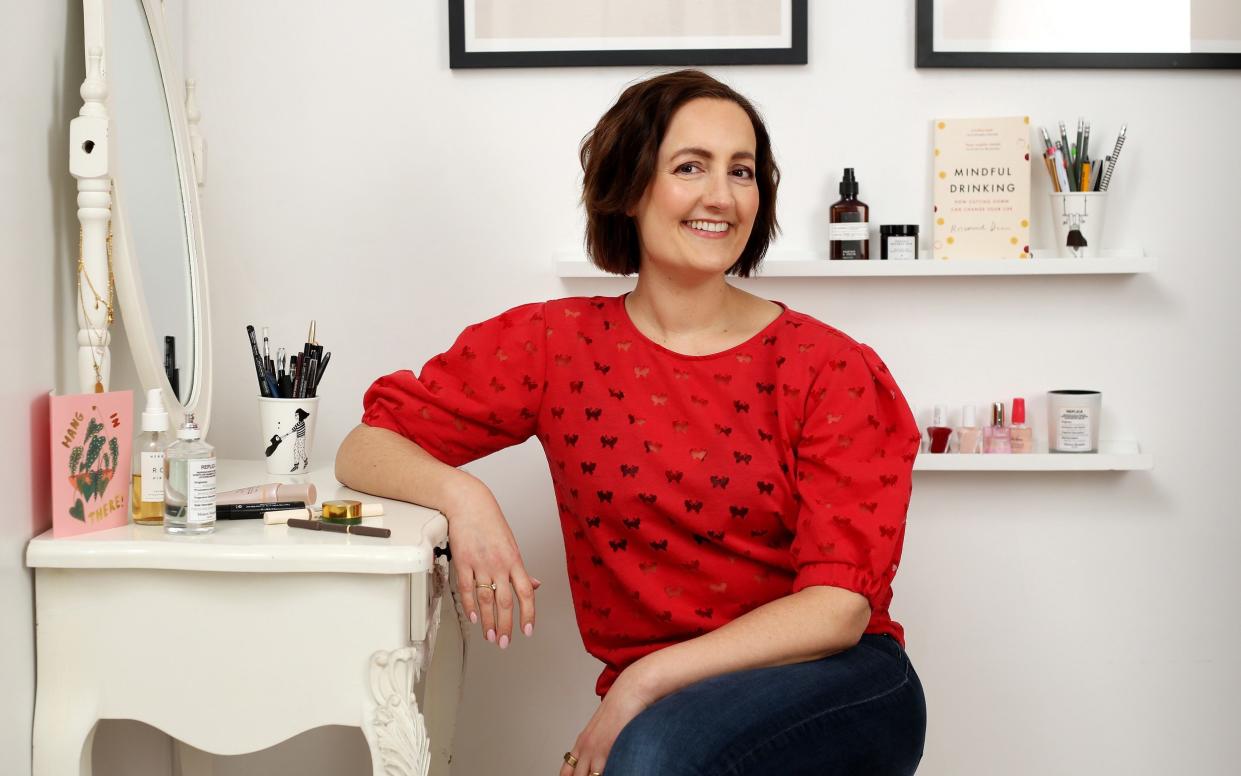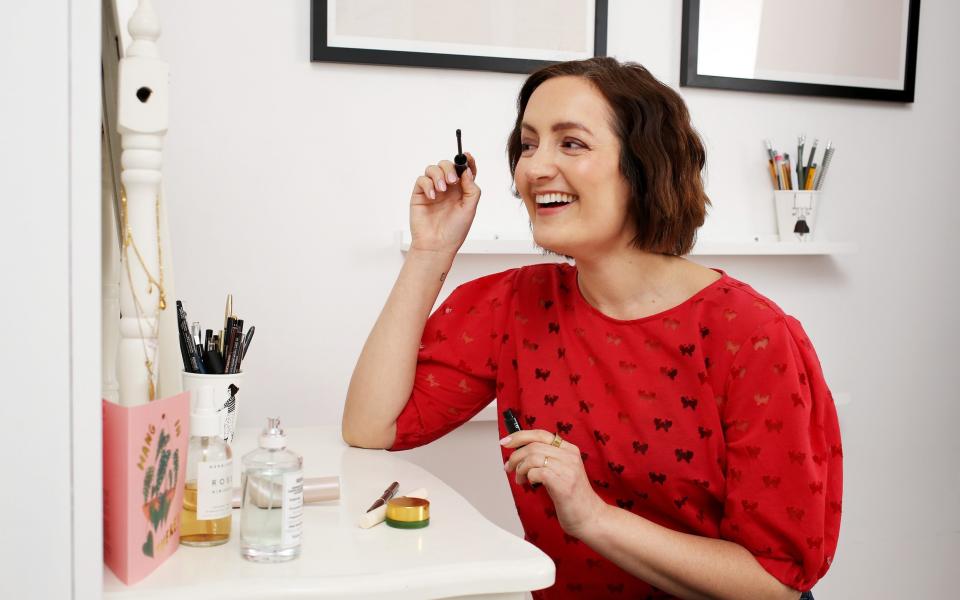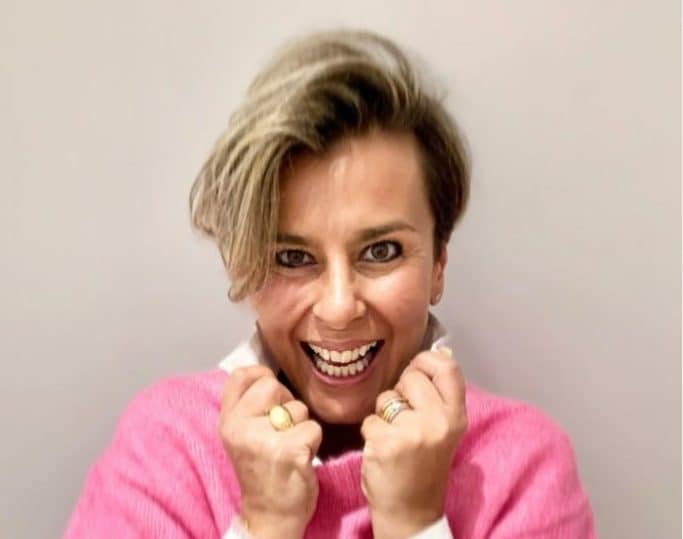‘Simple things like painted nails made all the difference during my cancer treatment’

One of the worst days during my treatment for breast cancer was not what you might expect. It wasn’t the initial shock of my diagnosis. It wasn’t coping with the nausea and fatigue of chemotherapy. It wasn’t even the 10-hour surgery to remove and reconstruct my right breast.
All of that was hard, of course. But what I find most difficult to think back on now was the day I looked in the mirror and didn’t recognise my own face.
My dark eyelashes and brows had completely disappeared after five months of brutal chemo, and my eyes appeared tiny in a face puffy and swollen from the steroids that are prescribed alongside it. My skin was dry and sensitive, my nails turning black and lifting up from my fingers, threatening to fall off. And all that remained of my long dark hair was a few wispy strands around a Friar Tuck-style bald patch.
It’s difficult for friends and family to understand how it feels to lose yourself in this way. They encourage you to focus on the positives, such as how lucky you are to have caught the disease in time to have curative treatment, or offer vague reassurances like “It’ll grow back.” But this can minimise your distress, and make you feel stupid and vain for even caring how you look.
If you are feeling like this, I want you to know that you are not alone. “Cancer treatment can create a sense of misidentify, where we don’t recognise ourselves,” explains Charlotte Goodacre, a Boots Macmillan beauty advisor. “That’s really difficult to come to terms with.” Luckily, help is at hand.

There are around 600 Boots Macmillan beauty advisors (or BMBAs), in larger Boots stores around the UK. Each of them has had specialist training by Macmillan and the No7 education team, to learn how to cope with the visible side effects of cancer treatment.
From recreating eyebrows with clever pencil techniques, to strengthening nail polish, to scar treatments for after surgery, to hypoallergenic moisturisers that won’t irritate your skin during radiotherapy… they even have a taboo-busting menopause skincare range.
I had no idea this free service existed when I was going through treatment. But I did attend online workshops hosted by the charity Look Good Feel Better, and I discovered the-c-list.com, a beauty and wellness platform for people receiving cancer treatment. Both have created warm and nurturing communities, which are just as powerful for your wellbeing as the practical tips and advice they offer. So it’s great to hear that BMBA training covers the emotional side of what cancer patients are going through, as well as the physical.
“We are not only there to offer practical advice around things like hair loss and changes in the skin, but also be a line of support,” says Charlotte. “We’re giving people the confidence to feel like themselves again. That isn’t necessarily something cancer-specific. It’s about finding a way to feel good, which could be as simple as a different lipstick colour.”
Charlotte has customers returning long after successful cancer treatment, when they’re no longer dealing with the visible signs, but they’ve come to love experimenting with make-up and skincare.
I understand this. During treatment, I realised the power of fashion and beauty to transform your day. That’s not to say I didn’t spend a lot of time in leggings and a hoodie with no make-up, particularly on the days following each of my 16 chemo infusions. But, on the days that I felt up to it, I learnt that something as simple as false eyelashes, painted nails or a bit of tinted moisturiser can make an extraordinary difference to how you feel.
Indeed, something unexpected happened as my hair slowly grew back and my eyebrows re-emerged. Skincare had become a calming ritual for me. I had a newfound gratitude for simple things like being able to apply mascara, or having the energy to go out with friends. Having previously lived in head-to-toe black, I found myself wanting to have more fun with fashion. It’s surprising how much a brightly coloured jumper can boost your mood.
When I was invited to a breast cancer awareness event held by the charity Future Dreams last year, none of the trusty old black dresses in my wardrobe felt right. They were sombre and funereal; not at all the vibe I wanted to project. I bought a brilliantly bright pink-and-red checked dress from Kitri, which was a joy to wear.
Being celebratory with my wardrobe is a show of mental resilience, and a middle finger to cancer. Because the other thing that this kind of diagnosis leaves you with is a sense that life is short: certainly too short not to wear the dress that you might previously have considered “a bit much”.
After the initial shock of seeing your face, hair and body decimated by cancer treatment, I’ve come to learn that you can rebuild yourself, from the ground up. It’s not easy, but it’s so worthwhile, because the new version of you is clear-eyed, authentic and refuses to sweat the small stuff.
“There’s a real correlation,” agrees Charlotte, “of the link between taking care of your appearance and of your mental health. Losing your sense of identity, on top of the other challenges that you face with a cancer diagnosis, is hard. We give people the confidence to go out and face the world. Because when you feel more confident, you look great, you feel great, and your loved ones will notice it too.” She smiles. “My favourite thing is seeing how happy and positive people are after our consultations versus how they feel when they first walk in. It makes such a difference.”
'Before my diagnosis I was in a rut'

Melissa, 51, was diagnosed with breast cancer in March 2020. She’s married with two sons, and lives in south London. She had surgery, chemotherapy and radiotherapy, and is now in remission
Before my diagnosis, I was very much a middle-aged housewife. I had long brunette hair, and stayed in my lane. Although I didn’t realise it at the time, I was stuck in a rut.
When I lost my hair, I decided to get a pink wig, because when else am I ever going to wear a pink wig? Even though my cheeks were flushed from chemo, and I had gained weight from the steroids, it felt good to have fun with how I looked. I could have grown my hair out by now, but I choose to keep it short. I love my bleached crop. It’s made me reassess what I thought I should look like, as a woman in her early 50s.
Losing your hair, particularly when your eyelashes and eyebrows go, is like having your armour stripped away. You’re left with the real you: your personality, your aura, your spirit. I realised that I like myself, just as I am, and maybe the rest of the stuff was actually holding me back.
That sounds like I’m saying I didn’t like my life before, which isn’t the case. But it made me re-evaluate everything. I was so uptight, and way too interested in whether my son got an A at school. In the grand scheme of things, that doesn’t matter. It’s so much more important to be happy and enjoy what you’re doing.
Before cancer, I was going through the motions. Cancer made me stop and think, “Oh my God, I could have died. What have I been doing with my life?”
It sounds crazy but it was the kick up the butt I needed to appreciate life, slow down and live in the moment. I’m happier now than I’ve ever been. This is the new me, and I like it.
‘Reconstruction: How to rebuild your body, mind and life after breast cancer’ by Rosamund Dean is out in May, and available to preorder now
To donate, please visit telegraph.co.uk/2022appeal or call 0151 284 1927

